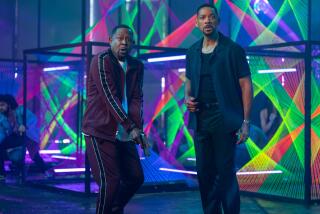Misplaced Outrage Over a Movie
- Share via
Maybe it’s because I spent so much of my childhood in my dad’s barbershop, pretending not to listen to the ribald jokes, the insults exchanged, the conspiracy theories masquerading as political commentary among the assortment of characters who frequented the shop my father and his brothers owned.
That’s probably what makes the new--and now controversial--movie “Barbershop” feel like as true a slice of urban black life as I have ever seen on screen.
And it’s also what makes the current uproar over the irreverent statements made in the film by one of its more outrageous characters seem so ridiculous to me.
The movie, a comedy about a day in the life of a barbershop on Chicago’s South Side, led the box office for the two weekends since its release, thanks largely to support by black moviegoers. Now, the film--written, directed and produced by blacks, with an uplifting message and largely black cast--has landed at the center of a firestorm stoked by a handful of black activists upset over a flurry of insults aimed at legendary heroes of the civil rights movement.
They’re demanding that movie-goers disavow the film, that the offensive passages be excised, that the filmmakers and MGM deliver a public apology for allowing dialogue that insults civil rights icons Rosa Parks and Martin Luther King Jr.
Never mind that the barber who issues the insults is derided by everyone else in the shop. “Is this a barbershop?” he asks, as they shout him down. If you can’t “talk straight” in a barbershop, then there’s nowhere left to speak your mind.
I admit I cringed at the offensive lines. They can’t be repeated here, but portray Martin Luther King Jr. as a philanderer and Rosa Parks as less than sincere.
But I also cringed later when I heard activist Al Sharpton assert in an interview that “there’s nobody in the black community who believes that [Martin Luther King]” engaged in sexual infidelity.” Sharpton’s been a busy man if he has heard from everyone in the black community.
And if he truly believes that every black person thinks--or even feels the need to believe--that King was squeaky clean, he hasn’t spent much time in a barbershop (no hair joke intended) or listening to Larry Elder types on talk radio.
The truth is, the black community is not nearly as monolithic and of-one-mind as either our critics or our so-called leaders would like us to be.
That may make controlling us as frustrating to them as trying to herd cats, but we have always drawn strength from our diversity.
Good people can, and do, disagree. Even in my own household, we were not of one mind as we left the movie theater last week.
My 11-year-old daughter, who idolizes Rosa Parks, was hurt that the “weird guy” in the movie “used the a-word” in the same breath that he mentioned Parks, as he observed dismissively that she didn’t “do nothing but sit” down.
And my fiance was troubled by the disrespect the insults implied: It’s bad enough when white folks denigrate black heroes. Must we also hold them up to ridicule just for a laugh? He’d like to see those lines cut from the movie, though he admits to more than a passing familiarity with fellows much like the on-screen buffoon.
I understand the protective instinct, the notion expressed by an outraged Jesse Jackson that some things are too sacred to joke about. Sometimes illuminating our private differences feels like airing dirty laundry in public.
But if we’re serious about keeping it real, about making art that portrays our lives, about respecting authenticity, then this is not the place to bring the airbrush out.
Jackson and Sharpton have complained that children will form negative views of black leaders because of a few insulting jokes in the movie. And I wonder why they’re not more concerned about, say, the insulting lyrics in rap music and the negative images of women that our children see day in, day out in music videos.
Where’s the outrage over that? And where is the demand that the dirty words come out, that we boycott black artists and stations that offer up little more than images of half-naked women gyrating around men who seem to have nothing on their minds but sex, money and Hennessy?
Tell me, what’s the greater threat, a few distasteful jokes in an otherwise uplifting movie, or a steady diet of images that reduce black men and women to caricatures of carnal superficiality?
If your children are old enough to see “Barbershop,” rated PG-13, and they don’t already know the truth about Rosa Parks and Martin Luther King Jr., then the shame rests on you, not the movie.
After all, Rosa Parks didn’t stay in her seat on the bus just because she was tired. It was not just a random move by an exhausted seamstress, but a strategic act of defiance by the secretary of the local NAACP, intended to mobilize a community.
And yes, it was uncomfortable for me to field questions from my daughter on the way home from the movie, about why King was criticized with a word more commonly found in the lyrics to rap songs, referring to girls who sleep around. But as I explained to her the allegations of his infidelity, the message was that our human failings don’t obliterate our capacity to do great things.
By the same token, “Barbershop” might not be flawless. But the movie has a story worth telling, characters worth knowing and a message worth hearing. And we don’t have to be ashamed of a less-than-perfect rendering of our history and humanity.
*
Sandy Banks’ column is published Sundays and Tuesdays. Her e-mail address is sandy.banks@latimes.com.
More to Read
Only good movies
Get the Indie Focus newsletter, Mark Olsen's weekly guide to the world of cinema.
You may occasionally receive promotional content from the Los Angeles Times.








